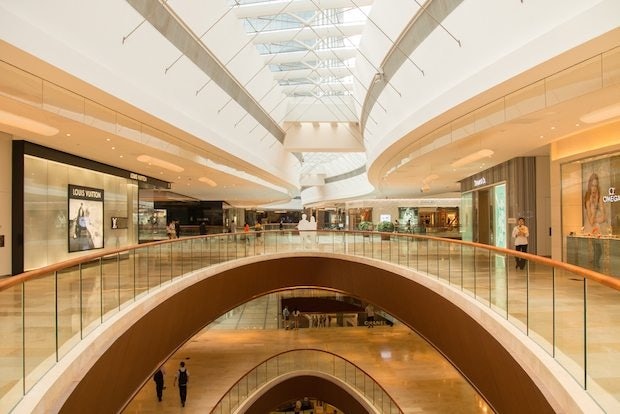
The TaiKoo Hui shopping center in Guangzhou. (Shutterstock)
While all eyes have been on the ongoing crisis in Greece, a possible “Grexit” and a questionable deal with European creditors, another worrying crisis has been unfolding in a far larger market—and one that has been critical to the luxury industry’s spectacular growth over the past decade—China.
In mid-June, the Shanghai stock exchange began a dramatic correction with significant knock-down effects. What does this mean for China and for the luxury industry? Perhaps more than we would like to acknowledge.
The run-up in Chinese shares has been nothing short of spectacular. In a year, Chinese shares had risen over 135 percent on the Shanghai exchange, and even more—150 percent—on the Shenzhen index. Since then, fueled by low interest rates and a “casino-like” exuberance, private investors rushed into the equity market. Consumers were encouraged further by assertions of Xi Jinping’s “Chinese Dream,” (Zhongguo meng, 中国梦), egged on by stories of people leaving their day jobs and housewives becoming wildly successful equity traders. And government officials were jubilant at first, keen to offset the dubious balance sheets of state-owned firms with inflows of private capital. “Another step in the modernization process,” it was hailed.
Yet as dramatic as the rise in equity prices has been, so has its fall. Since June 12, the Shanghai exchange has lost just under 30 percent of its value, wiping a staggering $3.5 trillion off of the market.
The official response was swift. A moratorium on public offerings and a prohibition of share sales by company officials and large shareholders was followed by a suspension in trading of half of companies, and a $20 billion fund which brokerage firms were forced to reinvest in the market. The market has since stabilized and rebounded slightly—up just over 2 percent in the past week. But is the rout over, and what is the fallout?
Many analysts are bearish, doubting that the correction has ended and expecting further falls in equity prices. Prices still remain 82 percent above last year, in a market where macroeconomic conditions have shown a significant slowdown. Optimists cite that only 9 percent of household wealth has been invested in the stock market and that retail, not institutional investors, hold close to 80 percent of shares.
Yet the effects of the stock market crash are already being felt in a critical sector that represents 50 percent of Chinese personal assets—housing. Since June, there has been a surge in cancellations of real estate and mortgage activity. Other high-ticket consumer items such as imported cars have also suffered. Mercedes-Benz and BMW, which have already been under heavy price pressure since the anti-corruption campaign began, are reporting a drop in foot traffic of 20-30 percent.
And herein lies the greatest threat to the luxury industry—consumer confidence. While a fall in share prices alone is unlikely to derail economic prospects, a lack of confidence will likely impact sales and margins as consumers seek more bargains. Luxury sales have already been contracting in mainland China while they have continued to expand abroad. In a context of weak consumer confidence, the ongoing disparity between domestic Chinese prices and prices abroad (among other factors) will only exacerbate the divide between successful travel sales and waning domestic Chinese consumption.
Those brands which have been slow to understand or address the traveling Chinese consumer in a strategic manner will be forced to shift gears even sooner. They will have to be more agile—and rapid—in adjusting their consumer engagement strategies (digital, retail, and CRM) to capture Chinese consumer attention whether it be in Paris, New York, or Dubai.
By the same token, those that continue to misallocate assets by maintaining bloated and unprofitable retail operations, and spend lavishly on traditional advertising, should see their rationalization plans accelerate.
Perhaps Deng Xiaoping had a message for the luxury industry as well when he spoke of modernization.
Philip Guarino is the European director at China Luxury Advisors.